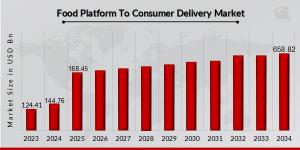The Digital Dining Disruption: Exploring the Platform to Consumer Delivery Market | Deliveroo, Glovo
Food Platform To Consumer Delivery Market Research Report: By Delivery Model, Type of Food Delivery, Consumer Segment, Payment Method, Value-Added Services
NEW YORK, NY, UNITED STATES, April 10, 2025 /EINPresswire.com/ -- The global food platform-to-consumer delivery market is experiencing robust growth, driven by shifting consumer behaviors, technological innovations, and the increasing demand for convenience. This press release provides an in-depth exploration of the market's segmentation, industry developments, prevailing trends, key drivers, and challenges shaping the future of food delivery services worldwide.The Food Platform to Consumer Delivery Market was valued at approximately USD 144.76 billion in 2024. It is projected to grow from USD 168.45 billion in 2025 to an estimated USD 658.82 billion by 2034. This reflects a robust compound annual growth rate (CAGR) of around 16.4% during the forecast period from 2025 to 2034.
Market Segmentation
By Delivery Model:
- Online Food Delivery Platforms: These platforms connect consumers with a variety of restaurants and food outlets, offering a centralized interface for browsing menus, placing orders, and making payments.
- Aggregator-Owned Fleets: Aggregators manage their own delivery logistics, providing end-to-end services from order placement to delivery, ensuring quality control and timely service.
- Restaurant-Owned Delivery Services: Some restaurants operate their own delivery systems, maintaining direct relationships with customers and ensuring brand consistency.
"Free Sample Copy" - Access a complimentary copy of our report to explore its content and insights: https://www.marketresearchfuture.com/sample_request/26206
By Type of Food Delivery:
- Ready-to-Eat Meals: Prepared meals delivered promptly, catering to consumers seeking immediate consumption without preparation.
- Cooked-to-Order Meals: Freshly prepared meals customized to consumer preferences, emphasizing quality and personalization.
- Meal Kits: Pre-portioned ingredients with recipes delivered for consumers to cook at home, combining convenience with a home-cooked experience.
- Groceries: Delivery of grocery items, allowing consumers to shop for essentials without visiting physical stores.
By Consumer Segment:
- Individual Consumers: The largest segment, driven by the convenience and variety offered by food delivery platforms.
- Corporate Customers: Businesses utilizing delivery services for employee meals, meetings, and events, seeking efficiency and variety.
- Special Events and Gatherings: Catering services for events, providing diverse food options and accommodating large orders.
By Payment Method:
- Cash-on-Delivery: Traditional payment method allowing consumers to pay upon receipt of their order.
- Online Payment: Digital transactions via credit/debit cards, digital wallets, and other online payment systems, offering convenience and security.
- Subscription-Based Services: Models where consumers pay a recurring fee for regular deliveries or membership benefits, fostering customer loyalty.
"Proceed to Buy" - Move forward with your purchase and gain instant access to the complete report : https://www.marketresearchfuture.com/checkout?currency=one_user-USD&report_id=26206
By Value-Added Services:
- Order Tracking: Real-time updates on order status, enhancing transparency and customer satisfaction.
- Loyalty Programs: Rewards and incentives for repeat customers, encouraging continued engagement.
- Personalized Recommendations: AI-driven suggestions based on consumer preferences and order history, enhancing user experience.
Industry Developments
The food platform-to-consumer delivery industry is undergoing significant transformations:
- Technological Integration: Adoption of AI and machine learning for personalized recommendations, efficient delivery routing, and enhanced customer service.
- Expansion into Quick Commerce: Companies are venturing into rapid delivery services, aiming to fulfill orders within minutes, particularly in urban areas.
- Strategic Partnerships: Collaborations between delivery platforms and major corporations are expanding service offerings and market reach. For instance, Amazon's partnership with Grubhub offers Prime members free meal delivery on qualifying orders.
Key Trends
Surge in Online Payment Adoption: The convenience and security of digital payments are leading to a decline in cash-on-delivery transactions.
Emphasis on Health and Sustainability: Growing consumer awareness is driving demand for healthier meal options and eco-friendly packaging.
Rise of Subscription Models: Consumers are increasingly opting for subscription-based services for regular meal deliveries, offering convenience and cost savings.
Focus on Personalization: Utilizing data analytics to offer personalized meal recommendations and promotions, enhancing customer engagement.
"Discover Competitive Analysis" - Gain a competitive edge by exploring our comprehensive competitive analysis, understanding the market positioning of key players and their strategies : https://www.marketresearchfuture.com/reports/food-platform-to-consumer-delivery-market-26206
Market Drivers
- Urbanization and Busy Lifestyles: The fast-paced urban life is increasing the reliance on food delivery services for convenience.
- Smartphone Penetration: Widespread use of smartphones facilitates easy access to food delivery apps, boosting market growth.
- Technological Advancements: Innovations in app interfaces, payment systems, and delivery logistics are enhancing user experience and operational efficiency.
- COVID-19 Pandemic: The pandemic accelerated the adoption of online food delivery as consumers sought contactless dining options.
Market Challenges
- Logistical Complexities: Ensuring timely deliveries while managing traffic, weather conditions, and order volumes poses challenges.
- Thin Profit Margins: High operational costs and competitive pricing strategies result in narrow profit margins for delivery platforms.
- Regulatory Compliance: Navigating varying regulations across regions regarding food safety, labor laws, and digital transactions.
- Sustainability Concerns: Addressing environmental impacts related to packaging waste and carbon emissions from delivery vehicles.
The global food platform-to-consumer delivery market is set for substantial growth, driven by evolving consumer preferences, technological innovations, and the demand for convenience. Industry stakeholders are poised to capitalize on emerging opportunities by focusing on personalization, sustainability, and strategic partnerships. As the market evolves, addressing challenges related to logistics, profitability, and regulatory compliance will be crucial for sustained success.
TABLE OF CONTENTS
EXECUTIVE SUMMARY
2 Market Introduction
3 RESEARCH METHODOLOGY
4 MARKET INSIGHTS
5 Market Dynamics
6 Market Factor Analysis
Discover more Research Reports on Food, Beverages & Nutrition Industry, by Market Research Future:
freshwater fish market: https://www.marketresearchfuture.com/reports/freshwater-fish-market-11675
light beer market: https://www.marketresearchfuture.com/reports/light-beer-market-19247
united states mattress market: https://www.marketresearchfuture.com/reports/united-states-mattress-market-20703
home use air purifiers market: https://www.marketresearchfuture.com/reports/home-use-air-purifiers-market-21384
india frozen foods market: https://www.marketresearchfuture.com/reports/india-frozen-foods-market-20705
asia pacific seasonings spices market: https://www.marketresearchfuture.com/reports/asia-pacific-seasonings-spices-market-20712
port wine market: https://www.marketresearchfuture.com/reports/port-wine-market-21321
coffee capsule market: https://www.marketresearchfuture.com/reports/coffee-capsule-market-21596
About Market Research Future:
Market Research Future (MRFR) is a global market research company that takes pride in its services, offering a complete and accurate analysis with regard to diverse markets and consumers worldwide. Market Research Future has the distinguished objective of providing optimal quality research and granular research to clients. Our market research studies by products, services, technologies, applications, end users, and market players for global, regional, and country level market segments, enable our clients to see more, know more, and do more, which help answer your most important questions.
Contact Us:
Market Research Future (Part of Wantstats Research and Media Private Limited)
99 Hudson Street, 5Th Floor
New York, NY 10013
United States of America
+1 628 258 0071 (US)
+44 2035 002 764 (UK)
Email: sales@marketresearchfuture.com
Website: https://www.marketresearchfuture.com
Market Research Future
Market Research Future
+1 855-661-4441
email us here
Visit us on social media:
Facebook
X
LinkedIn
Legal Disclaimer:
EIN Presswire provides this news content "as is" without warranty of any kind. We do not accept any responsibility or liability for the accuracy, content, images, videos, licenses, completeness, legality, or reliability of the information contained in this article. If you have any complaints or copyright issues related to this article, kindly contact the author above.
Thermoplastic Composites Market Projected to $ 59,260.3 Million Revenue by 2032, & Rise at CAGR of 8.31% Report by MRFR
Graphene Market Expected to Achieve a Strong 13.11% CAGR, to Reach USD 5.0 Billion by 2035
Waste to Energy Market to Reach $56 Billion by 2032 | Sustainability & Clean Power Drive Growth
Więcej ważnych informacji
 Jedynka Newserii
Jedynka Newserii

 Jedynka Newserii
Jedynka Newserii

Polityka

Polska może się stać Doliną Krzemową Europy. Potrzeba jednak wsparcia finansowego start-upów i mocniejszej deregulacji
Polskie start-upy skoncentrowane są głównie na rozwoju nowoczesnych technologii informatycznych i cyfrowych. Wyraźny nacisk na oprogramowanie i aplikacje oraz big data i data science wskazuje na silne zainteresowanie narzędziami analitycznymi i rozwiązaniami wspierającymi transformację cyfrową w różnych branżach – wynika z raportu „Rynek start-upów w Polsce. Trendy technologiczne”, który został opracowany w 2024 roku w MRiT. Zdaniem europarlamentarzystów Polska ma szansę się stać Doliną Krzemową, jednak rozwój start-upów blokowany jest m.in. przez ograniczony dostęp do finansowania oraz niekorzystne i nadmierne regulacje.
Transport
Na półmetku wakacji ceny paliw na stacjach nie powinny się wyraźnie zmienić. Znaczące różnice między regionami i stacjami

W sierpniu ceny benzyny, oleju napędowego i autogazu powinny pozostać na poziomach z lipca – uważa ekspertka rynku z firmy Reflex. Wyższe będą zawsze na stacjach premium, tych, które oferują bogatszą ofertę dodatkową, promocje dla uczestników programu lojalnościowego, oraz w regionach, w których tradycyjnie paliwa są droższe ze względu np. na wyższą siłę nabywczą mieszkańców. Różnice mogą sięgać kilkudziesięciu groszy na litrze. Obszary, wokół których te wartości oscylują, zależą z kolei od sytuacji globalnej. Warto patrzeć na sytuację na Bliskim Wschodzie i w Ukrainie.
Polityka
A. Mularczyk (PiS): Nawiązanie poważnego dialogu z Niemcami jest konieczne nie tylko w kontekście reparacji. Powinien być podpisany traktat polsko-niemiecki

– Nie wystarczy jednorazowy gest czy inicjatywa. To musi być podjęcie dialogu, być może też przygotowanie nowej umowy bilateralnej, nowego traktatu polsko-niemieckiego, który regulowałby wszystkie obszary, które wynikały ze skutków II wojny światowej – mówi Arkadiusz Mularczyk, poseł do Parlamentu Europejskiego z PiS-u. Podkreśla, że proces ten nie będzie łatwy, bo wymaga konsekwencji i stanowczości, ale widzi szansę w prezydenturze Karola Nawrockiego, który już zadeklarował kontynuację starań w tym zakresie. Zdaniem europosła wsparciem w polsko-niemieckim dialogu może być administracja Donalda Trumpa.
Partner serwisu
Szkolenia

Akademia Newserii
Akademia Newserii to projekt, w ramach którego najlepsi polscy dziennikarze biznesowi, giełdowi oraz lifestylowi, a także szkoleniowcy z wieloletnim doświadczeniem dzielą się swoją wiedzą nt. pracy z mediami.




![Nestlé w Polsce podsumowuje wpływ na krajową gospodarkę. Firma wygenerowała 0,6 proc. polskiego PKB [DEPESZA]](https://www.newseria.pl/files/1097841585/fabryka-nesquik_1,w_85,r_png,_small.png)




.gif)

 |
| |
| |
|